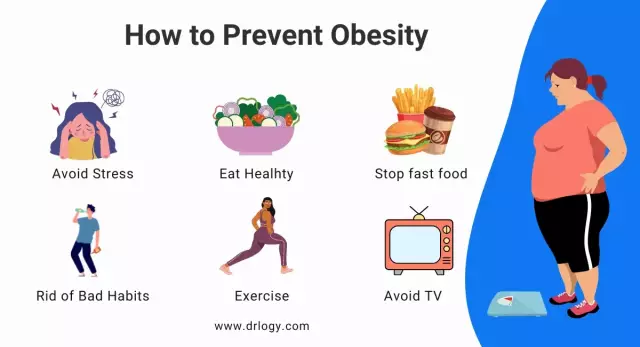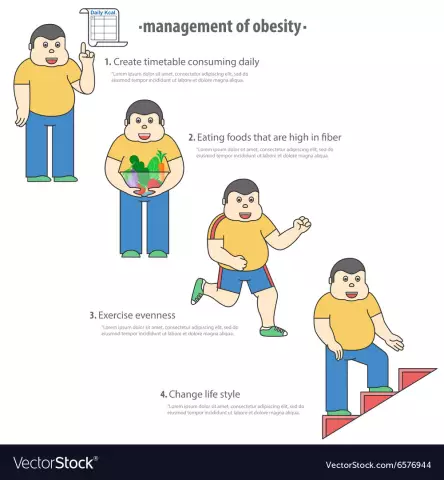- Author Rachel Wainwright wainwright@abchealthonline.com.
- Public 2023-12-15 07:39.
- Last modified 2025-11-02 20:14.
Top 5 leading causes of obesity
Obesity is today called a disease of the 21st century - this is how over the past 100 years the number of people suffering from overweight has increased. According to statistics, there are already about 1.5 billion obese people on Earth, and 500 million of them have an extreme degree of obesity, which negatively affects the quality and duration of life. What caused the increase in the number of obese people on the planet? How not to get into their ranks? Consider the 5 main prerequisites for increasing body weight in modern conditions.
Sedentary lifestyle
Among the causes of obesity, the palm belongs to a passive lifestyle. A modern person is spoiled: transport delivers him to his destination, home appliances, “helpers” make life easier, and online stores eliminate the need to leave home to make a purchase. Technological progress, saving time, deprives health. The body, created in order to spend energy, begins to accumulate its excess in tissues, muscles, blood vessels. Against the background of a lack of physical activity, hypodynamia develops - a disease that extensively disrupts the functions of the musculoskeletal system, digestive system, respiration, and especially the cardiovascular system, doubling the risk of death from stroke. The reason for such catastrophic consequences is completely innocent: the benefits of civilization. They were just abused.
What do doctors advise? Remember the importance of physical activity and use any opportunity to walk, climb without the help of an elevator, play with your child. The cost of health is low: with just 40 minutes of intense activity a day, the enemy called "obesity" will have no chance of winning.

Source: depositphotos.com
Improper nutrition
If the lack of movement is accompanied by unhealthy food intake, excess weight cannot be avoided. The modern culture of everyday life has affected not only the way of life of a person, but also his diet. Civilization has touched the process of making many products. Our diet is full of delicious sweets, flour, smoked products - unnatural dishes that clog the body, are poorly absorbed and give the body nothing but short-term pleasure and fast carbohydrates. Only 20% of the average person's diet consists of vegetables, fruits and whole grains. Under the pressure of flavoring additives, he increasingly prefers tasty food to healthy, and fast food to long-term food.
Digestive disturbances are provoked not only by an unbalanced diet, but also by non-compliance with the diet (refusal to eat breakfast, rare meals, overeating at night), as well as long storage of food, which destroys nutrients.
Nutritionists are categorical: in order to reduce the risk of obesity, it is necessary to revise the dietary system, abandoning the habitually excessive consumption of "sweets" in favor of the gifts of Mother Nature. So, the share of vegetables and fruits in a diet correct for a person should be at least 60%, which is 4-5 servings per day.

Source: depositphotos.com
Non-compliance with the daily routine
To the surprise of many, the lack of a daily regimen and a proper night's rest is also a significant reason for the rapid weight gain. Chaotic sleep, chronic lack of sleep, falling asleep after 10 pm cause a decrease in blood leptin - a hormone responsible for the feeling of satisfaction with food. Its absence becomes a serious reason for overeating: a person eats, but cannot get enough. In addition, a healthy 8-hour sleep without interruption helps to reduce the "stress hormone" in the blood - cortisol, which stimulates the breakdown of proteins and the accumulation of glucose in the blood. The correct daily regimen is an important condition for maintaining a normal body weight; neglect of this aspect negates all preventive measures. Indeed, even by controlling your appetite, a person is not able to control the action of hormones.

Source: depositphotos.com
Bad habits
Smoking is often considered a good way to lose weight, but this is nothing more than a delusion. In fact, a bad habit is a prerequisite for overweight problems. By suppressing appetite for a while, nicotine triggers a subsequent burst of signals from receptors about hunger. A person either takes up a cigarette again, or begins to absorb food with a vengeance, making up for the lack of a narcotic substance with a "pleasure hormone".
However, the harmful effect of smoking on the body does not end there. Nicotine reduces the amount of enzymes needed to digest food, reduces its nutritional value, and causes gastrointestinal disturbances. Under the onslaught of toxins, the body begins to "lose ground", the processes of processing and absorption of fats and nutrients are disrupted. Everyone knows what a slow metabolism leads to.
It is worth noting another disadvantage of nicotine: the lack of oxygen in the tissues provoked by it makes any physical exercise absolutely useless in terms of fighting excess weight. So, in one fell swoop, smoking is ripping out a few more bricks from the foundation of healthy body weight.

Source: depositphotos.com
Stress
Stress is called a faithful companion of excess weight for a reason. A disgruntled, depressed, grumpy person lacks serotonin, the "pleasure hormone" responsible not only for the degree of satisfaction with life, but also for good sleep, social behavior, memory and many other bodily functions. Serotonin is supplied by both pleasant events in life and food, in particular starchy foods and sweets. And by choosing the easiest way to cheer up, people "seize" depression. However, easy does not mean correct. The starch is broken down to glucose, the level of which in the blood quickly drops, which provokes another surge of dissatisfaction and contributes to weight gain.

Source: depositphotos.com
Experts advise to fight not with the effect, but with the cause: instead of artificially raising your mood, eliminate the causes of stress. And if it does arise, compensate for the situation in other ways: sleep at least 8 hours a day, walk in the sun and do more things that bring pleasure.
YouTube video related to the article:

Maria Kulkes Medical journalist About the author
Education: First Moscow State Medical University named after I. M. Sechenov, specialty "General Medicine".
Found a mistake in the text? Select it and press Ctrl + Enter.






